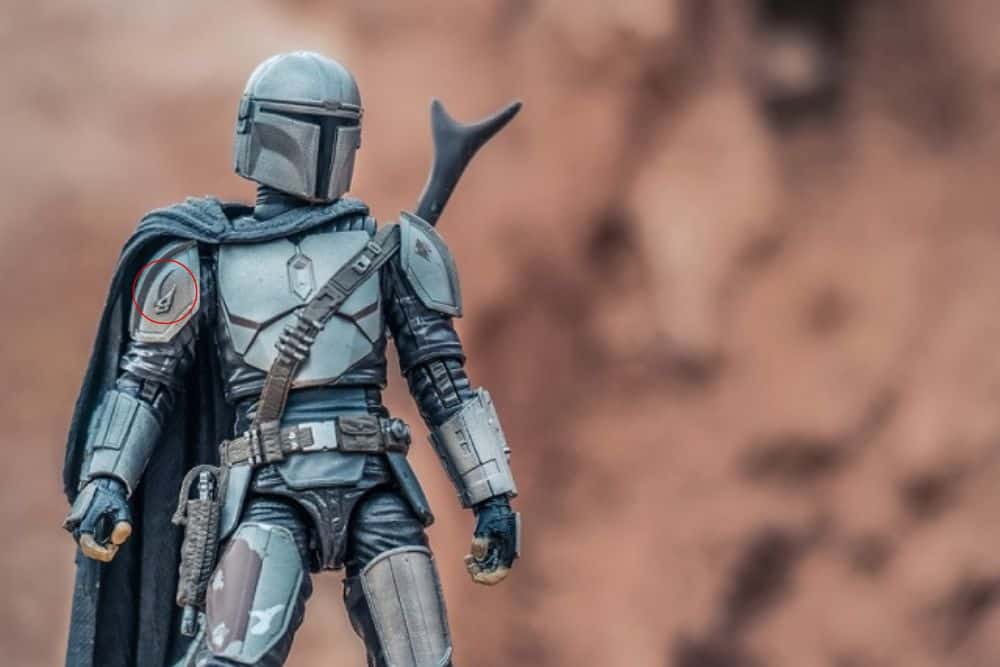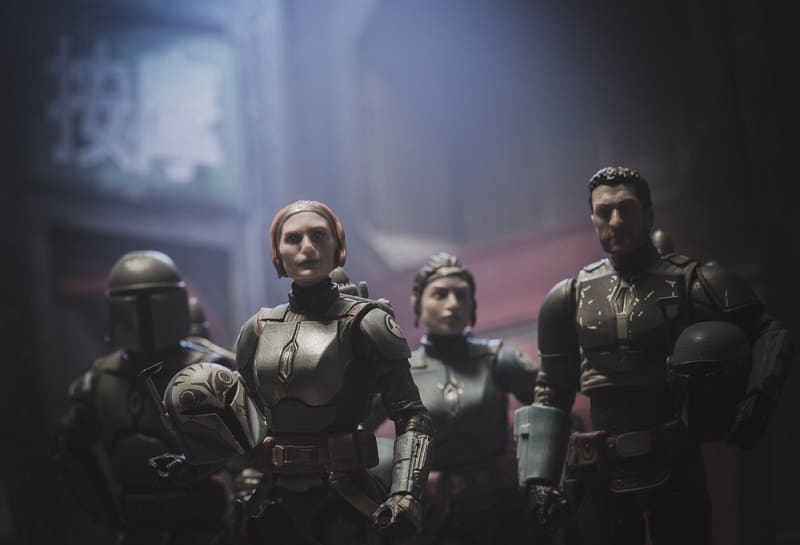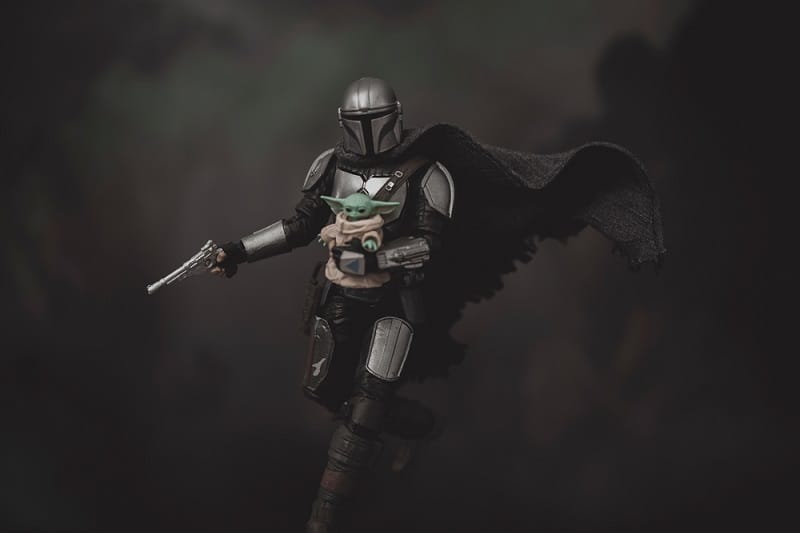The Mandalorian culture has become a topic of interest in the Star Wars galaxy. And we have received greater insight regarding the Mandalorians’ way of life in The Clone Wars and now in the hit Disney+ series, The Mandalorian.
However, if you are a newcomer to the series, Mandalorian culture can get somewhat confusing. One topic of confusion may involve Mandalorian houses, clans, and colors. But have no fear, we are here to cover the basics.
Mandalorian houses comprise two or more clans in a specific, often political, faction. Each clan is a basic family unit. They can even be as small as two individuals, which is the case with Din Djarin and Grogu, who belong to Clan Mudhorn. Or, clans can comprise hundreds of members.
Contents
Mandalorian Clans and Colors
Clans
Clans were basic family units in Mandalorian culture, and every clan associated itself with a specific faction, also called a house. These houses could comprise a few clans, with House Kast, House Vizsla, and House Kryze acting as the most prominent.
The most prominent houses interacted directly with the Mand’alor, an individual who led the Mandalorians. Overall, the Mandalorian clan and house structure acted as a basic chain of command, both before and after the Mandalorians were forced from their homeworld.
Colors
Another notable aspect regarding the Mandalorians is that their colors matter. You may notice that Mandalorian beskar’gam comprises different colors. Each color has a meaning, and by knowing the particular colors, they will tell you a lot about a Mandalorian clan’s character.
For example, Din Djarin’s brown beskar’gam stands for valor. Red represents a parent or ancestors, while orange displays a passion for life. Black equals justice and blue, reliability. Green stands for duty, while gray is associated with mourning and gold, with vengeance.
It isn’t surprising that some clans will only wear specific colors. Clan Eldar, for example, often went with black (justice), green (duty), and orange (passion for life).
Signets

Besides beskar’gam colors, you see members of some prominent clans wearing signets. Some of these signets, or sigils, stand as symbols for Mandalorians when they achieve something noteworthy, like a notable kill or conquest.
Other clans adopted their own signets, like Clan Eldar. While their signet is of unknown origin, it is said to resemble a snouted animal. Another signet, the mudhorn, symbolized the bond between Grogu and Din Djarin for the spontaneously-created Clan Mudhorn.
Mandalorian Houses
House Vizsla
Mandalorian houses act as the intermediary between the clans and the Mand’alor. We have met three prominent houses in the galaxy, with House Vizsla leading the way. This house comprised three clans, starting with Clan Vizsla. Clans Saxon and Wren also belonged to the house.
This House saw notable leaders like Tarre Vizsla and Pre Vizsla, and they were part of many notable conflicts in Star Wars Canon, including internal conflict during the Clone Wars and the Imperial Era.
House Kast
Little is known about House Kast. They made just one appearance, which occurred in Star Wars Rebels. While no particular character has been confirmed as a member of the house, we know Clan Rook is a sub-group. Veraslayn Kast and Rook Kast are believed to be members.
House Kryze

Duchess Satine Kryze was a prominent member of this house, and you may know her from The Clone Wars. They engaged in a conflict with Maul and Savage Opress, who supported a group of insurrectionists that overthrew Satine’s government.
After Maul executed Satine in front of her love interest, Obi-Wan Kenobi, her sister, Bo-Katan, led the house. Teaming up with the Jedi, Katan managed to defeat Maul. This allowed Katan to retake control of Mandalore, but shortly afterward, Clan Saxon betrayed her.
Mandalorian Clan Names
Clan Awaud
Nam Beroya led Clan Awaud before his death, and his adopted daughter, Vera, took over. Considered “Old Mandalorians” because of their splinter from Mandalore during the Clone Wars, this clan was one of many to fight against the Galactic Empire.
Clan Eldar
Clan Eldar pledged loyalty to Bo-Katan after the Mandalorian Civil War, and they also allied with other clans taking up arms against the Galactic Empire. They distinguished themselves with the leonid signet, and their armor included the colors dark green, orange, and black.
Clan Mudhorn
This clan comprised Din Djarin and Grogu. Its name stems from the mudhorn the duo battled together in Season 1 of The Mandalorian. During the battle, a mudhorn was making quick work of Din Djarin before Grogu used the Force to levitate the beast.
Clan Rook
Belonging to House Kast, Clan Rook’s warriors often wore gray, purple, and yellow armor. After the Mandalorian Civil War, they allied with Bo-Katan, and they became part of the Mandalorian resistance fighting against the Empire.
The coiled vexis served as their signet, something they also had in common with House Kast, along with their aforementioned armor.
Clan Saxon
Clan Saxon allied with House Vizsla, and with the Empire’s backing, they ruled Mandalore. An ensuing conflict with Clan Wren, however, started to unravel things for Clan Saxon. It started with Gar Saxon’s death at Ursa Wren’s hands.
Tiber then ruled, but the conflict with Clan Wren led him into an ultimate confrontation with Darksaber-wielding Sabine Wren.
Clan Wren
If you have heard of Sabine Wren, then you already know about one member of this clan. If not, you will meet her in Star Wars Rebels. This clan, originally aligned with the Galactic Empire, kicked out Sabine given her disdain for the Empire.
However, she ultimately managed to persuade Clan Wren to align with her and against the ruling Clan Saxon, a pro-Empire clan her family initially allied with. This led to the conflict with Clan Saxon, and Sabine’s ultimate victory over Tiber.
More Mandalorian Clans?
What you see in the above list is nothing more than facts regarding the known Mandalorian clans. Since the Star Wars universe is always expanding, we may see more clans appear, either in The Mandalorian or in future shows and films.
Given the history of the Mandalorians, Mandalore, and the galaxy itself, don’t be surprised if we end up adding more houses and clans to this list.

Sion Fawkes has been covering Star Wars since January 2022, expanding his expertise in Star Wars Canon, Legends, and MCU. When not writing, you can find Sion in the gym or running trails. He also likes watching sports and listening to audiobooks.
